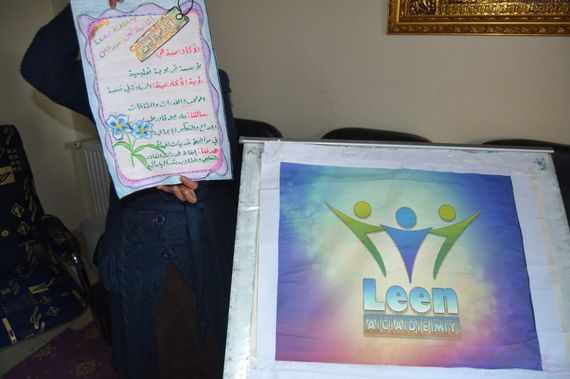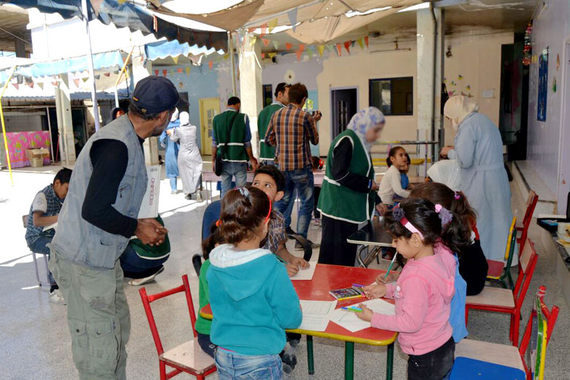Moaddamiyeh has been an early hotspot for anti-Assad demonstrations and the following government oppression. The town has endured the siege of the Assad regime since the end of 2012, and it is one of the towns hit by chemical weapons in August 2013. Despite all the violence, these activists believe in the principle of peaceful. And after five years of the Syrian revolution, their stories and experiences must be heard, their words reflect their struggles and hopes. Ten stories will be told through their voices.
Shams showing the posters she has done in the institution. Moaddamiyeh 2016.Photo: private
Shams AlShami is 39 years old and was preparing for her PhD in 2011 when the Syrian revolution against the Assad family began. She was an active participant in the demonstrations, which were held in Moaddamiyeh and other nearby areas.
"We needed to be part of the uprisings; it was a duty and not a choice for me and my family. Shouting out loud against the oppression felt really good. At that time I felt that my voice was really useful and I didn't care what that would cost us. We had started now and nothing should stop us, was what I thought at the time. It wasn't fair to ignore what was going on and ignore my fellows who were arrested from the university to complete my Ph.D., so basically I stopped."
At the beginning Shams took part in managing the revolutionary co-ordination in Moaddamiyeh on social media networks. She also played a big role in organizing feminist activities in the city against the oppression and the arbitrary detentions for activists and civilians, which were committed by the regime. Besides that, she was preparing to do her PhD as well as working as a teacher in a governmental school. But after her participation in the revolution she lost her place at the university as well as her job.
"I have witnessed everything in Moaddamiyeh including the siege, the chemical attack and whatever happened here in the last five years. It seems like a long period of time to me but after all, now I'm stronger and I'm really proud that I never left."
When Shams and her fellows in Moaddamiyeh started to experience the shelling by the warplanes, it was a new dangerous experience to them. And, for someone to survive it all really depended on luck. And wherever luck had taken the lead, Shams felt she didn't have a choice but to go about fulfilling her tasks.
"At the beginning, it was terrifying. I mean the first time I saw a Mig 23 warplane shelling us; I really couldn't believe my eyes. But, then we really got used to it. You hear the Mig doing shots and we pray silently hoping these shots didn't kill anybody and try to continue your day without even realizing that you might lose your own life with one of the next shot."
Together with the support of other activist Shams was conducting walking tours to meet with the residents in the streets and videotape interviews about the siege and the situation in Moaddamiyeh. This campaign was known as Sarkhet Balad, which literally means 'Home screams' referring to the appalling circumstances, which this campaign enabled the people to speak up about.
"The siege was and still is one of the worst things that we could go through. I remember when we were working on the campaign we were really exhausted. At that time, we were undergoing the first siege in 2013. It's normal to see people who are shaking while talking to you due to the low blood sugar. We were trying to post the stories through the limited access to the internet and on the other hand, we were also trying to help in other fields besides media.
I started teaching again then. It was not about teaching or learning, I wasn't teaching the kids in the school, but I was gathering our relative's and neighbors' children, who are around 12-18 years old - mostly teenagers- in our house. Talking to them and playing some games. In all this chaos and violence, what were mostly beginning to be missed were the morals. These kids really needed to just talk and discuss things freely. That space is badly needed. Our gatherings were only really about letting them speak in one way or another. We are way older than them and we know exactly what we want. We need to talk about the freedom a lot, the freedom of speech, how not to misunderstand freedom and how to try and cope with these squalid circumstances. And, the results have been really positive, they desperately want to talk and they are calling me the mentor and I really love that. They are eager, powerful, determined and all they need is to be put in the right direction. I hope I can help them with the last part."
Shams while working with other volunteers in children workshop. Moaddamiyeh 2016.Photo: private.
It's been five years for Shams staying in the town without leaving it at all and she seems not to regret that. Working with that group of teenagers gave Shams the motivation to start a small development institute called Leen. The institute is to support the teenagers and the young people to learn a profession. It consists of two departments, the theoretical department where the students learn about creativity, goals and how to set up their goals, and the practical part where the students can choose one of the profession listed by the institute.
"You might think that the conversation has changed and I'm not describing a situation under siege. Yet that's not totally true as we are under siege again, the crossings are closed to Moaddamiyeh since the end of 2015 and the siege once again is getting to one of its worst phases. But, we can't just be waiting to starve to death. Life will go on and we are going to complete our path with the rest of the people who will survive. They might finish the road without me and I might not survive but at least then I'll leave the footsteps to be followed."
The projects that the institute is working on in the practical part are professions that could fit with the siege and planting projects mostly.
"People sometimes try to discourage us telling us it's useless to do anything under these circumstances. But, we are trying to do our best no matter what happens. Furthering the human mind and educating these teenagers is the best thing we can do now, we can't just sit down and feel useless. There is a saying that I love and I keep repeating it to our students as it always motivates them: 'Live with faith, live with work, live with struggle, live with hope and appreciate the value of life that you've got!', so that's literally what we are trying to do."
The story was originally published in German on WirMachenDas.Jetzt

